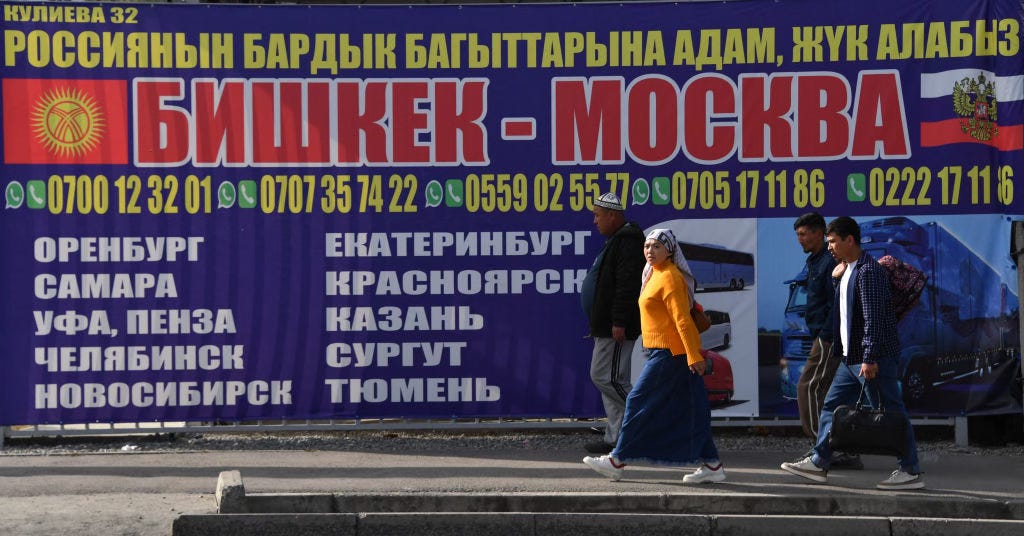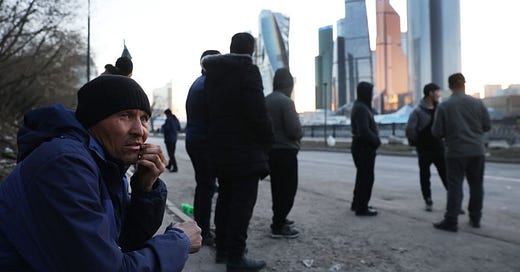‘Migrants are the easiest target’. Russia’s latest crackdown on foreign labour
This year, Russia created a centralised database to track and restrict the rights of migrants who have supposedly broken the law. There are already 600,000 people on the list, many by mistake.
More than six million migrants live in Russia, according to the most conservative estimates, and entire sections of the economy depend on their labour. Despite this, they remain one of the most vulnerable groups in the country and are subject to frequent discrimination.
This year, Russia launched a “register of controlled persons”, a system designed to keep track of migrants who violate the law. When a person is placed on the register they can lose their job, their place at university, and even access to their own money. But as the BBC has discovered, many are put on the list by mistake.
Arsen* woke up one morning in early April to discover the banking app on his phone had been blocked.
The 25-year-old, who had moved from Kazakhstan to Russia in 2020, had been out with friends the night before and wanted to transfer one of them a small amount of money.
But when he tried to do this, an alert reading “rejected” flashed up on a red background.
An explanation followed: “The Ministry of Internal Affairs of the Russian Federation has added you to the list of controlled foreign nationals. You are prohibited from all banking operations except: incoming money transfers; mandatory payments for state services; cash withdrawals of no more than 30,000 roubles [£280] per month.”
At first, Arsen thought it was some kind of glitch. Like millions of other migrants from Central Asia he was in Russia legally, working and renting accommodation.
He called the bank, but they said they did not deal with such issues and advised him to contact the ministry.
Searching around his flat, he found around 500 rubles [£4.50] in cash, which he used at first to get to a police station. But the officers there redirected him to a shopping centre in northern Moscow, home to a local migration office that usually deals with registration and work permit issues.
When he arrived there he discovered the next available appointment would be in 10 days.
Arsen’s rent was almost due. He needed to buy food. He contacted several lawyers but had no money for an initial consultation.
With the last of his money, Arsen decided to go to Sakharovo, a notorious migration centre some 40 miles southwest of Moscow.
Sakharovo is known for its huge queues and humiliating procedures such as blood and urine tests to detect “socially significant diseases” like HIV, syphilis and tuberculosis.
“For three hours I stood outside, in a queue in the snow,” Arsen told the BBC.
“There were women, children, pensioners. There were armed riot police around…swearing at everyone. I felt like I was in some kind of ISIS camp. Iron fences everywhere. They treat you like animals.”
Water and snacks were available for inflated prices and when Arsen eventually got inside he saw “children sleeping in corners”.
After more than eight hours, Arsen received a paper wristband with an identifying number that he had to wear while his paperwork was being processed. He travelled back on public transport with what he called “the brand”.
When he returned to Sakharovo the following day for fingerprinting and tests, Arsen said he was met with dirty medical rooms and corridors, filthy toilets with no working flush, and floors littered with blood-stained cotton wool.
‘Strengthen control’
Migrants to Russia have long faced discrimination, but the “register of controlled persons”, launched in March this year, has brought fresh obstacles.
Lawmakers, who first proposed the legislation in 2024, said there was a need to “strengthen control” and create a centralised record of migration rule violators.
As well as facing limits on withdrawing and transferring money, those placed on the list cannot move to a different region, travel abroad, buy or sell property, marry, drive, open a bank account or register a business.
In the first month of its existence, some 685,000 people have been added to the list. Given that there are around 6.2 million migrants in Russia, that means roughly one in every nine is now considered a “controlled person”.
In Russia - where citizens of many neighbouring countries benefit from visa-free entry - the term “illegal immigrant” primarily refers not to people who have entered the country illegally but to those who have overstayed, worked without the right permit, or failed to register their address.
Russian authorities often claim that migrants commit a disproportionate number of crimes.
Last year, the head of Russia’s Investigative Committee, Alexander Bastrykin, said that serious crimes committed by migrants had increased by 32%, especially serious crimes by 26%, and extremism-related crimes by 147%.
But these claims contradict official data from the Ministry of Internal Affairs, which shows that the number of crimes committed by foreigners has actually decreased.
Most migrants in Russia come from Uzbekistan, followed by Tajikistan, Kazakhstan, China, Kyrgyzstan, Armenia, Azerbaijan, and Belarus.
Some of these countries rely heavily on money sent home by workers in Russia. In 2024, the World Bank estimated that these remittances made up nearly half of Tajikistan’s GDP, nearly 20% of Kyrgyzstan’s, and 14% of Uzbekistan’s.
Migrant workers are also crucial to Russia’s economy. In Moscow, over half of construction workers are migrants. In transport, retail, hospitality, and catering, they make up about a third of the workforce, according to research by Moscow’s Higher School of Economics.
And these workers do not typically compete with Russian citizens for jobs, instead filling roles that locals tend to avoid.
“The statement that Moscow is built, guarded and cleaned by migrants is not an exaggeration,” researchers from the Higher School of Economics wrote, warning that harsher migration policies could lead to labour shortages.
‘Slavs only’
Despite this, some landlords refuse to rent to migrants, with advertisements explicitly stating that rooms will be given to “Slavs only”.
Even those who do offer housing will often refuse to register tenants officially, despite a legal obligation to do so. Without registration, migrants risk becoming “illegal” in the eyes of the state. Many are forced to rely on unofficial firms that provide fake documents.
Children of migrants are often turned away from schools or nurseries. Police raids at workplaces are common, and rights groups say officials frequently extort bribes by threatening deportation.
After the deadly attack on Moscow’s Crocus City Hall in March last year - allegedly carried out by four Tajik nationals - the authorities launched sweeping raids. Thousands of migrants were detained for supposed violations, and Tajik community leaders reported a rise in harassment. The Tajik government advised its citizens in Russia to stay indoors.
Alongside the new register, Russian authorities have tightened migration rules in a number of other ways in the past year.
It is now harder to get a residence permit through marriage - applicants must prove long-term cohabitation, not just the marriage itself. Children who do not speak basic Russian can be barred from school, and new laws allow the Interior Ministry to expel migrants without a court hearing.
Basic mistakes
In reality, many people who find themselves on the register of controlled persons have done nothing wrong, says Valentina Chupik, a human rights lawyer and founder of the Centre for the Protection of Migrants’ Rights.
Chupik herself arrived in Russia from Uzbekistan in 2005 as a political refugee and has spent years offering migrants legal assistance. In 2021, however, Russia revoked her status and banned her from re-entering the country for 30 years. She is now based abroad. She believes the move was punishment for her criticism of the Interior Ministry.
She told the BBC that in the first two days after the register was introduced, she was contacted by more than 30 people who said they had been listed by mistake.
The BBC asked the ministry how many errors had occurred but received no reply.

One of those who turned to Chupik is Olesya*, a young woman who has lived and worked legally in Russia for years.
Like Arsen, she found her bank account suddenly blocked and discovered she was listed as an “illegal immigrant”.
The error? An “o” in her surname had been written as an “a” on her migration card.
“She went straight to the migration department,” Chupik told the BBC. “At first they threatened her with deportation. We submitted complaints, called senior officials, and finally got them to review her documents. Eventually, they apologised and admitted it was their mistake. But they told her she would have to wait for them to fix it.”
More than a month later Olesya is still waiting. Meanwhile, her job is at risk. Her employer could face a huge fine for hiring someone listed as an illegal immigrant.
“Couldn’t they have checked her passport?” said Chupik. “It’s laziness. This whole system is built on carelessness and indifference.”
Some analysts have suggested that these problems are due to the authorities being in a transitional phase, and trying to coordinate across different departments.
But that is little comfort for those whose lives have been upended.
‘Public stigma’
People can end up on the register for many reasons. Some have expired visas or permits. Others are caught out by missed deadlines or paperwork errors.
“But in practice, even a minor issue can lead to inclusion in the register,” said K.R., an immigration lawyer from Volgograd, who asked that only his initials be used because of the dangers of speaking openly on this subject.
“Registers are instruments of pressure, isolation and repression,” he said. “Being included is a public stigma and comes with serious legal consequences. Our state uses this model of control under the pretext of restoring order.”
Mirat*, a university student from Turkmenistan, was fined in February for not paying a bus fare, even though he had a valid student pass.
He appealed to a higher court, but while that was pending, the transport authority brought a case in a lower court. That court ruled against him, ignoring his appeal, and treated the unpaid fare and late fine as two separate offences. This is enough, under Interior Ministry guidelines, to class him as a repeat offender.
Mirat has now been added to the register and is facing expulsion from university.
“Ticket inspectors need to meet their quotas, and migrants are the easiest targets,” says Chupik. “They’re people without rights who are easy to extort bribes from, easy to push around. And if needed, easy to send to war.”
Russia’s war in Ukraine has also become a tool of pressure. Migrants are sometimes offered fast-tracked citizenship or the lifting of entry bans in exchange for signing military contracts. There have been reports of people in detention being given the chance to “volunteer” for the front line instead of facing prison or deportation.
This comes as Russian officials regularly criticise other countries for allegedly discriminating against Russian-speaking minorities. In a 2024 report, the Foreign Ministry accused the West of maintaining “racist attitudes inherited from colonialism”.
But in Russia, when officials speak of “lightening up” regions to make them less “darkened” by foreigners, such comments go unchallenged.
For Arsen, the young man who stood in the snow at Sakharovo and was subjected to tests in dirty rooms, there was at least a happy ending.
A few days after being added to the register he was suddenly removed from it. No one told him why he had been listed, and no apology has been forthcoming.
* Names have been changed at the request of those quoted
Read this story in Russian here.
English version edited by Theo Merz.







There will be a backlash against this racism and mistreatment, though things will probably get worse for migrants first.